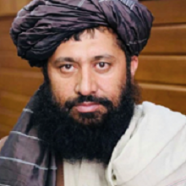Overview
Haji Muhammad Idris is a senior Taliban leader.Shafiq Ahmad, “Who's who in Taliban interim government?,” September 9, 2021, https://www.aa.com.tr/en/asia-pacific/whos-who-in-taliban-interim-government/2360424. Following the Taliban’s takeover of Afghanistan in August 2021, Idris was named head of Da Afghanistan Bank, the country’s central bank.“Taliban forms 33-member cabinet in Afghanistan: Full list,” Hindustan Times, September 8, 2021, https://www.hindustantimes.com/world-news/taliban-forms-33-member-cabinet-in-afghanistan-full-list-101631066722518.html.
Idris, an ethnic Uzbek, hails from Jawzjan, northern Afghanistan and previously worked on financial issues with the late emir of the Taliban, Mullah Akhtar Mohammad Mansour. Media sources claim Idris does not have formal financial training or higher education but was a respected Taliban member who eventually directed the financial commission of the Taliban.“Taliban name acting head of central bank as economic turmoil grows,” Reuters, August 23, 2021, https://www.reuters.com/world/asia-pacific/taliban-name-acting-head-central-bank-economic-turmoil-grows-2021-08-23/. The Taliban’s financial commission operated in the shadows during the two decades after the fall of the Taliban’s first regime in 2001. According to the United Nations Security Council, the commission’s activities collected illegal taxes from business and farmers to fund the insurgent group’s operations.Eltaf Najafizada, “Taliban Name Obscure Official as Central Bank Chief With Crisis Looming,” Bloomberg, August 23, 2021, https://www.bloomberg.com/news/articles/2021-08-23/taliban-name-obscure-official-central-bank-chief-as-crisis-looms.
Following the Taliban’s fall from power in Afghanistan in 2001 after seizing control of Kabul in 1996, the movement created a de facto governmental order that placed Taliban members—shadow officials—in control of specific areas within Afghanistan. The movement used these operational areas to counter the Afghan government and repel U.S. troops deployed in the country following the al-Qaeda orchestrated 9/11 attacks. Before the attacks, al-Qaeda had used Afghanistan as a sanctuary to strategize and plan attacks against western targets. Following U.S. military deployment in the country in 2001, the Taliban conducted regular attacks to enforce their control among the Afghan population, resulting in two decades of political and social instability throughout Afghanistan.“Who are the Taliban,” BBC News, August 18, 2021, https://www.bbc.com/news/world-south-asia-11451718.
To reduce ongoing violence and put an end to the Afghan War, the U.S. government and the Taliban began peace negotiations in February 2019, eventually signing a peace agreement on February 29, 2020, in Doha, Qatar.Kathy Gannon, “Mullah’s rise charts Taliban’s long road back to power,” Associated Press, August 18, 2021, https://apnews.com/article/afghanistan-taliban-abdul-ghani-baradar-e80165eb6c65fc7ea8fae50212ba56c8; “Pullout and guarantees dominate talks with US: Taliban spokesman,” Al Jazeera, February 26, 2019, https://www.aljazeera.com/news/2019/2/26/pullout-and-guarantees-dominate-talks-with-us-taliban-spokesman; Ayaz Gul, “Taliban Expects Peace Deal With US in Next Meeting,” Voice of America, July 31, 2019, https://www.voanews.com/a/south-central-asia_taliban-expects-peace-deal-us-next-meeting/6172955.html. The terms of the Doha agreement stated that the United States would fully withdraw military troops from Afghanistan within the next 14 months. In exchange, the Taliban agreed to renounce al-Qaeda and prevent al-Qaeda and other groups from using Afghanistan as a base for terrorism against the United States. The Taliban also agreed to negotiate a permanent ceasefire with other Afghan militants and the Afghan government.Asad Hashim, “Pakistan warns US of ‘spoilers’ on US-Taliban deal in Afghanistan,” Al Jazeera, March 1, 2020, https://www.aljazeera.com/news/2020/03/pakistan-warns-spoilers-taliban-deal-afghanistan-200302093650382.html; Matthew Lee and Kathy Gannon, “US and Taliban sign deal aimed at ending war in Afghanistan,” Associated Press, February 29, 2020, https://apnews.com/491544713df4879f399d0ff5523d369e; Susannah George and Dan Lamothe, “Afghan government objects to elements of U.S.-Taliban peace deal,” Washington Post, March 1, 2020, https://www.washingtonpost.com/world/asia_pacific/afghan-government-questions-aspects-of-us-taliban-peace-deal/2020/03/01/0a973228-5a68-11ea-8efd-0f904bdd8057_story.html.
The Taliban began its offensive against major Afghan cities on August 6, 2021.Susannah George and Ezzatullah Mehrdad, “Taliban fighters overrun an Afghan provincial capital for the first time since withdrawal of foreign forces,” Washington Post, August 6, 2021, https://www.washingtonpost.com/world/2021/08/06/afghanistan-taliban-nimruz/. On August 15, Afghan President Ashraf Ghani fled Afghanistan and thousands of Afghans poured into Kabul’s airport as Taliban fighters entered the city. By August 16, the Taliban laid siege to the presidential palace and took complete control of Kabul, declaring the war in Afghanistan had ended.Rahim Faiez, and Joseph Krauss, “Taliban sweep across Afghanistan’s south; take 4 more cities,” Associated Press, August 13, 2021, https://apnews.com/article/middle-east-taliban-c6c8d4a41c554f36031a8131538d1402. The last U.S. troops flew out of Kabul on August 30, 2021, ending a 20-year war that took the lives of 2,500 American troops and 240,000 Afghans and cost about $2 trillion.Peter Baker, “All in or All Out? Biden Saw No Middle Ground in Afghanistan.,” New York Times, September 1, 2021, https://www.nytimes.com/2021/08/28/us/politics/trump-taliban-biden-afghanistan.html; Nancy A. Youssef and Gordon Lubold, “Last U.S. Troops Leave Afghanistan After Nearly 20 Years,” Wall Street Journal, August 30, 2021, https://www.wsj.com/articles/last-u-s-troops-leave-afghanistan-after-nearly-20-years-11630355853. The Taliban has claimed that it would take on a more “moderate” approach in their ruling of the country, and that women are allowed to have roles in public life in observance of “Islamic law.”“Factbox: Taliban seek to present a moderate face as they take control in Afghanistan,” Reuters, August 15, 2021, https://www.reuters.com/world/asia-pacific/taliban-seek-present-moderate-face-they-take-control-afghanistan-2021-08-15/.
On August 23, 2021, the Taliban appointed Idris as the head of Da Afghanistan Bank, the central bank of Afghanistan. As head of the central bank, Idris is expected to bring order to the country’s war-crippled economy.“Taliban name acting head of central bank as economic turmoil grows,” Reuters, August 23, 2021, https://www.reuters.com/world/asia-pacific/taliban-name-acting-head-central-bank-economic-turmoil-grows-2021-08-23/. On September 7, 2021, the Taliban announced the official appointments within their caretaker government. The government is exclusively male, with many positions filled with veterans from their hardline movement in the early nineties.Matthieu Aikins and Jim Huylebroek, “Taliban Appoint Stalwarts to Top Government Posts,” New York Times, September 7, 2021, https://www.nytimes.com/2021/09/07/world/asia/taliban-women-protest-kabul-afghanistan.html; Kathy Gannon, “Taliban form all-male Afghan government of old guard members,” Associated Press, September 8, 2021, https://apnews.com/article/middle-east-pakistan-afghanistan-arrests-islamabad-d50b1b490d27d32eb20cc11b77c12c87.
Associated Groups
- Extremist entity
- Taliban
- Read Threat Report
- Type(s) of Organization:
- Insurgent, regional, terrorist, transnational, violent
- Ideologies and Affiliations:
- Deobandi, Islamist, jihadist, Pashtun, Salafi, Sunni, Wahhabi
- Position(s):
- Head of Da Afghanistan Bank
The Taliban seized power in Afghanistan in August 2021 after previously leading a violent insurgency in Afghanistan and Pakistan. The group is closely affiliated with al-Qaeda.
